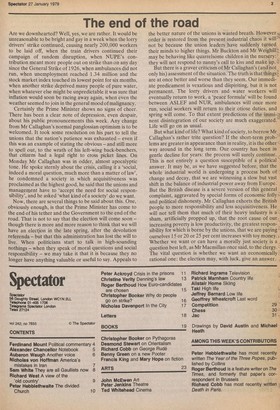The end of the road
Are we downhearted? Well, yes, we are rather. It would be unreasonable to be bright and gay in a week when the lorry drivers' strike continued, causing nearly 200,000 workers to be laid off, when the train drivers continued their campaign of random disruption, when NUPE's contribution meant more people out on strike than on any day since the General Strike of 1926, when ambulances did not run, when unemployment reached 1.34 million and the stock market index touched its lowest point for six months, when another strike deprived many people of pure water, when whatever else might be unpredictable it was sure that inflation would soon be racing away again, when even the weather seemed to join in the general mood of malignancy.
Certainly the Prime Minister shows no signs of cheer. There has been a clear note of depression, even despair, about his public pronouncements this week. Any change from Mr Callaghan's normal panglossian optimism is to be welcomed. It took some resolution on his part to tell the unions that the nation's patience was exhausted — even if this was an example of stating the obvious — and still more to spell out, to the wrath of his left-wing back-benchers, that citizens had a legal right to cross picket lines. On Monday Mr Callaghan was in odder, almost apocalyptic tone. He spoke sternly about the crisis, calling it a 'social, indeed a moral question, much more than a matter of law', he condemned a society in which acquisitiveness was proclaimed as the highest good, he said that the unions and management have to 'accept the need for social responsibility', and he asked 'what kind of a society' do we want.
Now, there are several things to be said about this. One, obviously enough, is that the Prime Minister has come to the end of his tether and the Government to the end of the road. That is not to say that the election will come soon — though there is more and more reason to think that we will have an election in the late spring, after the devolution referenda — but that this administration has lost the will to live. When politicians start to talk in high-sounding nothings — when they speak of moral questions and social responsibility — we may take it that it is because they no longer have anything valuable or useful to say. Appeals to
the better nature of the unions is wasted breath. However> order is restored from the present industrial chaos it wilfl not be because the union leaders have suddenly turned their minds to higher things. Mr Buckton and Mr Weighillz may be behaving like quarrelsome children in the nursery: they will not respond to nanny's call to kiss and make up.
But there is a graver criticism of Mr Callaghan's (and not only his) assessment of the situation. The truth is that things are at once better and worse than they seem. Our immediate predicament is vexatious and dispiriting, but it is not permanent. The lorry drivers and water workers will eventually return to work, a 'peace formula' will be found between ASLEF and NUR, ambulances will once more run, social workers will return to their otiose duties, and spring will come. To that extent predictions of the imminent disintegration of our society are much exaggerated. — Life will go on as usual.
But what kind of life? What kind of society, to borrow Mr Callaghan's rather trite question? If the short-term problems are greater in appearance than in reality, it is the other way around in the long term. Our country has been in gentle decline for years: the process will surely continue. . This is not entirely a question susceptible of a political answer. It may be, as we have suggested before, that the whole industrial world is undergoing a process both of change and decay, that we are witnessing a slow but vast shift in the balance of industrial power away from Europe. But the British disease is a severe version of this general complaint, aggravated by special forms of economic folly and political dishonesty. Mr Callaghan exhorts the British people to more responsibility and less acquisitiveness. He will not tell them that much of their heavy industry is a sham, artificially propped up, that the root cause of our increasing poverty is low productivity, the greatest responsibility for which is borne by the unions, that we are paying ourselves 15 or 20 or 25 per cent increases with toy money.. Whether we want or can have a morally just society is a question best left, as Mr Macmillan once said, to the clergy. The vital question is whether we want an economically rational one: the election may, with luck, give an answer.






































 Previous page
Previous page